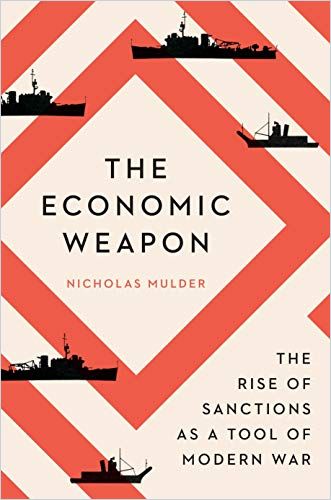Cornell University assistant professor Nicholas Mulder details the history and modern-day applications of tariffs and economic sanctions.

Do Sanctions Work?
In this intriguing study, Cornell University assistant professor Nicholas Mulder traces the use of peacetime sanctions from their origins as deliberate wartime weapons to their current phase as a geopolitical deterrent. He ably examines their efficacy — or lack of it — in modern-day use.
Economic Sanctions
Throughout geopolitical history up to and through World War I, warring nations wielded economic sanctions as weapons. At the 1919 Paris Peace Conference, French and British representatives championed deploying economic sanctions as a means of active diplomacy during peacetime. Their suggestion — at the time, a radical one — was that a belligerent nation could be brought to heel by financial punishment rather than military hostilities.
Commercial and financial blockade, a policy developed as a form of economic war, was reconceived as a prophylactic against war.Nicholas Mulder
Sanctions have shaped geopolitics ever since. The goal of an economic blockade is to isolate the targeted state. The point of sanctions is to render the sanctioned nation poorer: It will have less access to crucial commodities, be less able to fund a war, and lose support from its suffering citizenry. As with a shooting war, economic sanctions claim civilian casualties — ordinary people typically bear the brunt of sanctions.
Economic sanctions are hostile acts. Before the United States entered WWI, the American Secretary of State fretted whether US tariffs could be interpreted as a declaration of war. Scholars warned that economic sanctions could propel a sanctioned state to retaliate with traditional warfare. Economic sanctions are effective only when a critical mass of nations embrace them.
Their coercive power was administered not out of the cockpit of a bomber or through the breech of a cannon but from behind a mahogany desk.Nicholas Mulder
WWI began after the Balkan Wars of 1912-1913, interrupting negotiations over the frontier between the combatants. In 1921, Yugoslavia prepared a full-scale invasion of Albania. The League of Nations responded by threatening a far-reaching blockade. Leaders in Belgrade backed down and withdrew their troops.
A few years later, the League of Nations defused an impending war between Greece and Bulgaria. The conflict seemingly began when a Greek soldier pursued his runaway dog across the Bulgarian border and Bulgarian guards killed the soldier. The episode appealed to Greece’s militarist dictator, Theodoros Pangalos, who viewed war as a worthwhile method of boosting his sagging popularity. The League of Nations drafted proposed sanctions against Greece and showed them to the government in Athens. Again, the threat of harsh economic measures proved sufficient to maintain the peace in Europe. Throughout the 1920s and into the early 1930s, the League of Nations dangled the possibility of sanctions to rein in bad actors but never had to resort to enacting the economic punishments.
World War II
Western democracies had birthed sanctions as a way to prevent war, but in the 1930s, the threat of sanctions in fact fed some nations’ belligerence.
In 1935, Italian dictator Benito Mussolini massed troops on the border of Ethiopia. In September of that year, Mussolini received warnings of sanctions if he didn’t stand down, but Italy nonetheless invaded Ethiopia in October 1935. Mussolini ran an ample industrial economy, and sanctions seldom check a determined aggressor. Sanctions blocked Italian exports from leaving the country, with the goal of starving Italy of foreign currency. This slow-motion form of punishment would cause pain, but it didn’t lead Mussolini to call off the invasion.
In Italy, Mussolini launched an autarchia that he envisioned as an inoculation against sanctions. If Italy became self-sufficient in food and energy, he reasoned, foreign blockades wouldn’t affect it. Sanctions also backfired in Berlin, where the Nazi regime responded by building plans for self-sufficiency and conquest. Adolf Hitler’s annexations of Austria and Czechoslovakia were a grab for resources that would undermine the effectiveness of any future blockades.
By 1940, the United States was the world’s largest oil producer. It was the only oil supplier to Spain, a neutral nation considering an alliance with Germany and Italy. Britain asked America to change Madrid’s mind by limiting oil exports. The specter of an oil embargo forced Spanish officials to remain officially neutral.
President Franklin D. Roosevelt then introduced a more sweeping economic policy, the Lend-Lease program. This $7 billion initiative wasn’t a sanction but an incentive. Washington, DC, agreed to lend arms, ships, and supplies to Britain and its allies, as long as the nations agreed to return the items after the war. Roosevelt said the United States would act as the “arsenal of democracy.” The program intended to aid Britain without saddling US allies with the massive debts they had taken on in WWI to buy matériel from America.
Less Effective
Economic sanctions have evolved to reflect the modern economy. Sanctions now include travel bans and asset freezes aimed at individuals, as well as prohibitions on trade with nations. Embargoes attempt to curb human rights abuses, weaken totalitarian regimes, and thwart nascent nuclear programs. One-third of humanity currently resides in nations under sanctions.
Economic coercion can find a place in politics if its goals and methods enjoy legitimacy.Nicholas Mulder
During the Cold War, American blockades targeted the Soviet Union, China, North Korea, and Vietnam. The United States has sanctioned Iran, Iraq, and Libya. But sanctions’ effectiveness has waned. From 1985 through 1995, Western sanctions worked in 35% to 40% of cases. By 2016, their chances of success had fallen below 20%.
A Timely Overview
The 2024 US presidential election campaign has produced a great deal of rhetoric about tariffs and sanctions. And it seems that one candidate has little functional understanding of how sanctions work, which generates a confused and ignorant electorate. Thus, all the talk of sanctions renders Professor Mulder’s history necessary, welcome, and timely. He breaks down sanctions’ history and considers, with layered understanding, the central question of: Do they work? Mulder’s overview offers surprising historical sagas, some demonstrating the efficacy of sanctions and some showcasing their uselessness. Voters, economists, businesspeople, and students of geopolitics and economic history will find this an informative and thought-provoking read.









